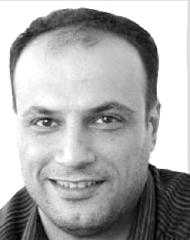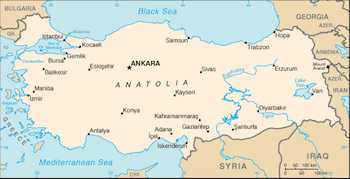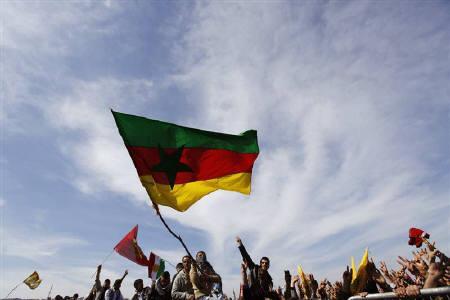By REBWAR KARIM WALI
 The wave of arrests of Kurds in Turkey as well as violence between the Kurdistan Workers’ Party (PKK) and the Turkish security forces that began again in July show no signs of abating.
The wave of arrests of Kurds in Turkey as well as violence between the Kurdistan Workers’ Party (PKK) and the Turkish security forces that began again in July show no signs of abating.
The latest episode was the October 19 attack by PKK fighters on Turkish military bases in Hakkari province that led to the highest number of Turkish casualties since 1993.
In response, the police have joined the military’s new operations against the PKK. The police have also detained and imprisoned hundreds of Kurdish political activists as part of what is known as “KCK dossier.”
The KCK stands for the Union of Communities in Kurdistan, which was founded by the PKK’s jailed leader, Abdullah Ocalan. A PKK leader recently told me that the number of arrests have not been this high since the 1980 military coup.
The most recent PKK attack shocked Turkey and drew a strong reaction from the Kurdistan Region of Iraq as well. In a message of condemnation, Kurdistan Region’s President Massoud Barzani described the attack as a “crime” and noted that it came as there were ongoing efforts to find a political solution to Turkey’s Kurdish issue.
The office of Kurdistan Prime Minister Barham Salih also denounced the attack. Shortly afterward, based on a request from Turkish Prime Minister Recep Tayyip Erdogan, former Kurdistan Region Prime Minister Nechirvan Barzani met with the Turkish prime minister and foreign minister in Ankara on a trip representing the region’s president. It was announced that the Kurdistan Region president would soon visit Ankara as well.
Turkey demands the Kurdistan region provide military assistance in its fight against the PKK. But to what extent is that possible?
“The Turkish army doesn’t have the same zeal and energy as it once did, and the PKK is no longer afraid of it”
According to informed Turkish sources, the Turkish plan appears as follows: A) Turkey can militarily occupy all areas in the Kurdistan Region that the Kurdish Peshmarga and security forces cannot control; B) The Kurdistan Region should promise that its Peshmarga forces will not attack Turkey, aid the PKK or allow its fighters to attack Turkish soldiers.
Turkey, in return, has promised to return control of all areas to the Kurdistan Regional Government’s Peshmarga forces when the forces are able to secure the areas.
According to the Turkish sources, the response of the Kurdish delegation to this proposal has been the following: A) The Kurdistan Region understands its responsibility to not allow its soil to be used for attacks against its neighbors; B) The Peshmarga forces will not take part in any fighting in support of any side; C) There is only one solution to this problem and that is a peaceful and political one. D) Ocalan’s conditions need to be improved and the government should talk to him.
Turkey is hoping to achieve two major goals in relation to the PKK.
First, to lower the bar of Kurdish demands before the process begins to amend the constitution. This can be done by delivering a blow to the PKK.
Second, the PKK has become a problem for Turkey’s ambitious foreign policy. The clashes between the PKK and the army undermine Turkey’s focus on its foreign and regional policy, so Turkey wants to rid itself of that problem.
If these are the main Turkish goals in battling the PKK, the Kurdish group also wants to increase pressure on the PKK as much as possible.
Even if Ocalan was not freed, he would be placed under house arrest. The PKK and Ocalan need be accepted as the only partners in resolving the Kurdish issue and need to engage in open negotiations.
The Kurdistan Region cannot engage in any military cooperation with Turkey because the Kurdish political leadership believes this problem can’t be solved through war. The Kurdish public would never allow this to happen.
Therefore, Barzani’s trip to Ankara can be only useful in terms of advancing a political solution. The direction Turkey has taken will lead to nowhere. The role that the Kurdistan Region has played in the past in convincing the PKK to announce a ceasefire needs to continue because that role is important for the PKK, Turkey and the Kurdistan Region.
That role ending would especially harm the PKK. The current complications in Turkey’s Kurdish areas and the end of large-scale civilian activities are a testament to that claim.
But it seems the PKK is no longer ready to accept a ceasefire because it sees the current circumstances as in its interest. Besides, the Turkish army doesn’t have the same zeal and energy as it once did, and the PKK is no longer afraid of it.
The PKK has become a mobile state and has shown that neither the pro-Kurdish Peace and Democracy Party (BDP) or any Kurdish political figure has the capital and initiative to make decisions in the name of Kurds. So, in the end, Turkey should decide that all roads lead to Ocalan and his conditions.
If Ocalan is taken out of Imrali prison and is allowed movement, he will pour some water on the fire that has currently engulfed Turkey. The PKK will lay down arms and Turkey will rid itself of this conflict. The Kurdistan Region can play a crucial role in this regard.
via Rudaw in English….The Happening: Latest News and Multimedia about Kurdistan, Iraq and the World – Turkey’s Demands and Kurdistan’s Answers.




